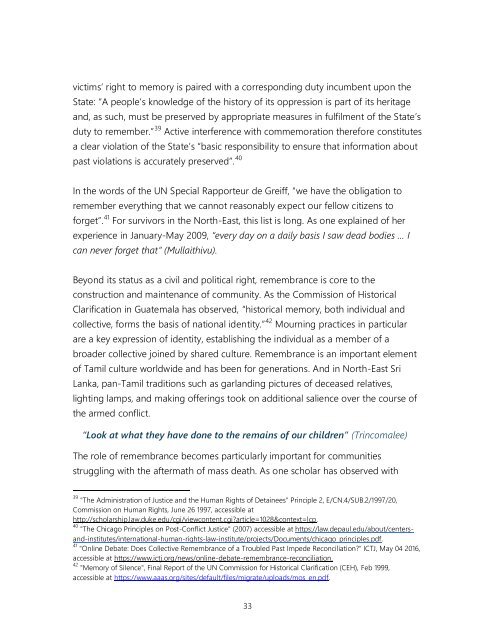7VqrhDjFg
7VqrhDjFg
7VqrhDjFg
Create successful ePaper yourself
Turn your PDF publications into a flip-book with our unique Google optimized e-Paper software.
victims’ right to memory is paired with a corresponding duty incumbent upon the<br />
State: “A people’s knowledge of the history of its oppression is part of its heritage<br />
and, as such, must be preserved by appropriate measures in fulfilment of the State’s<br />
duty to remember.” 39 Active interference with commemoration therefore constitutes<br />
a clear violation of the State’s “basic responsibility to ensure that information about<br />
past violations is accurately preserved”. 40<br />
In the words of the UN Special Rapporteur de Greiff, “we have the obligation to<br />
remember everything that we cannot reasonably expect our fellow citizens to<br />
forget”. 41 For survivors in the North-East, this list is long. As one explained of her<br />
experience in January-May 2009, “every day on a daily basis I saw dead bodies … I<br />
can never forget that” (Mullaithivu).<br />
Beyond its status as a civil and political right, remembrance is core to the<br />
construction and maintenance of community. As the Commission of Historical<br />
Clarification in Guatemala has observed, “historical memory, both individual and<br />
collective, forms the basis of national identity.” 42 Mourning practices in particular<br />
are a key expression of identity, establishing the individual as a member of a<br />
broader collective joined by shared culture. Remembrance is an important element<br />
of Tamil culture worldwide and has been for generations. And in North-East Sri<br />
Lanka, pan-Tamil traditions such as garlanding pictures of deceased relatives,<br />
lighting lamps, and making offerings took on additional salience over the course of<br />
the armed conflict.<br />
“Look at what they have done to the remains of our children” (Trincomalee)<br />
The role of remembrance becomes particularly important for communities<br />
struggling with the aftermath of mass death. As one scholar has observed with<br />
39 "The Administration of Justice and the Human Rights of Detainees" Principle 2, E/CN.4/SUB.2/1997/20,<br />
Commission on Human Rights, June 26 1997, accessible at<br />
http://scholarship.law.duke.edu/cgi/viewcontent.cgi?article=1028&context=lcp.<br />
40 "The Chicago Principles on Post-Conflict Justice" (2007) accessible at https://law.depaul.edu/about/centersand-institutes/international-human-rights-law-institute/projects/Documents/chicago_principles.pdf.<br />
41 "Online Debate: Does Collective Remembrance of a Troubled Past Impede Reconciliation?" ICTJ, May 04 2016,<br />
accessible at https://www.ictj.org/news/online-debate-remembrance-reconciliation.<br />
42 "Memory of Silence", Final Report of the UN Commission for Historical Clarification (CEH), Feb 1999,<br />
accessible at https://www.aaas.org/sites/default/files/migrate/uploads/mos_en.pdf.<br />
33


